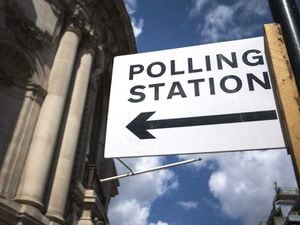NHS mental health beds are full, Royal College of Psychiatrists warns
A third of psychiatrists said they have been forced to find beds for patients outside their local area.

NHS mental health beds are so full that patients are going without the treatment they desperately need, the head of the Royal College of Psychiatrists has warned.
Dr Adrian James said services are so stretched that at least 600 people in England are currently being treated outside their local area – despite a Government pledge to end clinically inappropriate placements by 2020/21.
In an interview with the PA news agency, Dr James described the strain on the system, as a survey for the College showed that 85% of psychiatrists are experiencing more pressure on beds compared with the same time last year.
Some 320 psychiatrists took part in the poll in December, with 92% saying fewer than 5% of beds were available in their trust. There are around 17,700 mental health beds in England.
Dr James said: “Our recommendation is that, in order to run an efficient service, you should have about an 85% bed occupancy.
“That’s because you’ve got people coming in and going out and there isn’t a lot of slack in the system. To be admitted into a psychiatric ward you’ve got to be really quite unwell these days.
“Our survey shows that beds are 95% occupied and actually, in terms of the ebb and flow of the system, that is full.”
Dr James said at least 600 people are currently out of area for routine psychiatry services which should be provided locally.
This can harm patients by increasing their distress, separating them from their family, friends and local psychiatry team, and slowing their recovery.
“If you’re 100 miles away, your family find it harder to visit and it’s more difficult for your local community team to engage with you so they can plan for your discharge to your local area.
“We know that there are some units that are actually completely full significant amounts of the time. It’s no way to run a system.”
He said psychiatrists are doing their best by treating people in the community when no beds are available.
“But undoubtedly there are risks to individuals – risks to themselves, risks to their health, risks to their safety, but also sometimes the safety of others,” he added.
The Royal College points to longstanding issues with underfunding and a lack of beds, which have only been exacerbated by the Covid-19 pandemic.
Dr James said: “We know that the amount of urgent and acute work that psychiatrists are doing has gone up as a result of Covid.
“Sadly there are some people we know are not coming forward, and they wait and wait and wait until their condition worsens, and they present much later, more acutely unwell.
“And we know that those people are presenting to (hospital) emergency departments.”
“We’ve had people presenting with deliberate self-harm, with psychosis, with eating disorders,” he said.
“When it comes to Covid, we know that mental illness is heavily socially determined as well as there being a genetic component.
“So there’ll be more people with complex grief reactions, people who have experienced Covid themselves who have developed depression and anxiety, and we know those who have been ventilated have much higher rates of post-traumatic stress disorder.
“There are also early signs that there are some causes of psychosis, of dementia and depression, which are directly as a result of Covid.
“Going forward, there’s the economic effects that we know will have a real effect on mental illness, then there’s the effect of people not being able to engage in activities that we know are good for their mental health, and of not being able to engage with people that they love.
“OK, you can do a Zoom call, but it’s not same as somebody meeting you and saying ‘How are you?'”
Dr James said he has been working hard to tell policymakers that “when the virus is under control, the mental health effects are not over”.
He added: “If you look at anything comparable in terms of disasters and other pandemics, then the mental health effects roll on for about 18 months to two years afterwards.
“So we need to hold the Government to account to say ‘You said you’d fund all the NHS needed to fight Covid’, and that doesn’t stop when the virus is under control. The mental health elements will continue.”
Psychiatrists have noted that children and young people are one of the groups most affected by the pandemic, Dr James said.
“In some ways it’s hardly surprising – they’ve lost a lot of their social networks, they’ve lost a lot of their supportive networks. Teachers are often very good at picking up distressed children.
“There’s the uncertainty, there’s the exams issue, there are people who will be coming up to leaving school, there’s the uncertainty about employment.
“So there’s a whole raft of things that are happening. And, of course, social media and everything online.
“Social media is an amazing, very positive thing in many ways but if that’s the only way that you’re communicating with people, we know that there are lots of issues to do with social media, to do with bullying.
“If you’ve got no way of extracting yourself from that because that is all that you have – the online stuff – that can be particularly damaging.
“I think there are lots of things that are actually very worrying in relation to children.”
Regarding older people suffering loneliness, Dr James said they are less likely to talk about their mental health and less likely to engage online.
He added: “I think that is a very a real worry in relation to digital poverty and digital exclusion.”
The Royal College of Psychiatrists is calling for an extra £150 million funding in 2021/22 to support people returning home from mental health inpatient hospitals in order to bridge the gap between hospital and community care.
It also wants the Government to increase bed capacity and commit to building six more mental health hospitals by 2024/25.
Shadow mental health minister, Dr Rosena Allin-Khan, said it was “concerning” beds were full, adding: “After a decade of being underfunded and under-resourced, Covid poses additional challenges for the future of the NHS.
“Mental health needs will continue long after the virus is under control. The Government needs to take mental health seriously in its response to Covid-19.”
An NHS spokeswoman said: “The covid pandemic is clearly leading to increased demand for mental health care, so as well as £50 million already deployed to improve the availability of inpatient beds, in April the NHS getting another £500 million to fund needed extra mental health services.”





